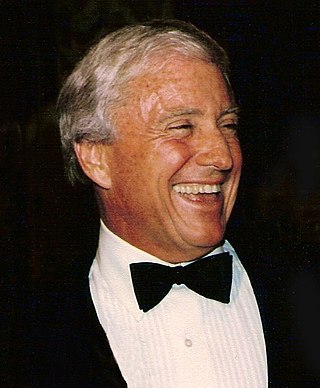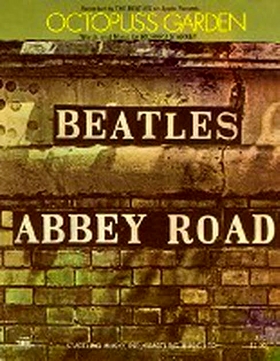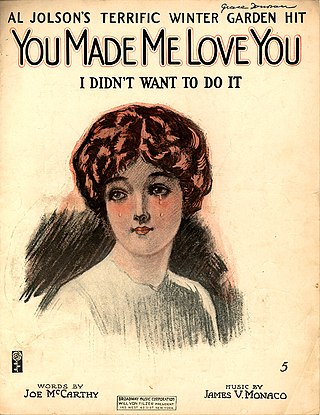
The Muppet Show is a variety sketch comedy television series created by Jim Henson and starring the Muppets. The series originated as two pilot episodes produced by Henson for ABC in 1974 and 1975. While neither episode was moved forward as a series and other networks in the United States rejected Henson's proposals, British producer Lew Grade expressed enthusiasm for the project and agreed to co-produce The Muppet Show for the British channel ATV. Five seasons, totalling 120 episodes, were broadcast on ATV and other ITV franchises in the United Kingdom and in first-run syndication in the United States from 1976 to 1981. The programme was produced and recorded at the ATV Elstree Studios in Borehamwood, Hertfordshire.

The Ed Sullivan Show was an American television variety show that ran on CBS from June 20, 1948, to March 28, 1971, and was hosted by New York entertainment columnist Ed Sullivan. It was replaced in September 1971 by the CBS Sunday Night Movie.

Allan Sherman was an American musician, satirist and television producer who became known as a song parodist in the early 1960s. His first album, My Son, the Folk Singer (1962), became the fastest-selling record album up to that time. His biggest hit was "Hello Muddah, Hello Fadduh", a comic song in which a boy describes his summer camp experiences to the tune of Ponchielli's Dance of the Hours.

"I Am the Very Model of a Modern Major-General" is a patter song from Gilbert and Sullivan's 1879 comic opera The Pirates of Penzance. It has been called the most famous Gilbert and Sullivan patter song. Sung by Major-General Stanley at his first entrance, towards the end of Act I, the character introduces himself by presenting his résumé and admitting to a few shortcomings. The song satirises the idea of the "modern" educated British Army officer of the latter 19th century.

Mervyn Edward Griffin Jr. was an American television show host and media mogul. He began his career as a radio and big band singer, later appearing in film and on Broadway. From 1962 to 1986, Griffin hosted his own talk show, The Merv Griffin Show. Griffin also created the game shows Jeopardy! and Wheel of Fortune through his own production companies, Merv Griffin Enterprises and Merv Griffin Entertainment.

Dr. Teeth and the Electric Mayhem, or simply The Electric Mayhem, are an American Muppet rock group that debuted in 1975 on the pilot for the sketch comedy television series The Muppet Show. They are the house band for The Muppet Show, with personalities and appearances inspired by prominent real-life rock music and jazz performers. They subsequently appeared in various Muppet films and television specials and have also recorded album tracks and covered numerous songs. The Electric Mayhem consists of Dr. Teeth on vocals and keyboards, Animal on drums, Floyd Pepper on vocals and bass, Janice on vocals and lead guitar, Zoot on saxophone, and Lips on trumpet. The band's members were originally performed by Jim Henson, Frank Oz, Jerry Nelson, Richard Hunt, Dave Goelz, and Steve Whitmire, respectively; they are presently performed by Bill Barretta, Eric Jacobson, Matt Vogel, David Rudman, Goelz, and Peter Linz, respectively.
"Mah Nà Mah Nà" is a popular song by Italian composer Piero Umiliani. It originally appeared in the Italian film Sweden: Heaven and Hell. It was a minor radio hit in the United States and in Britain, but became better known internationally for its use by the Muppets and on The Benny Hill Show.
"My Bonnie Lies over the Ocean", or simply "My Bonnie", is a traditional Scottish folk song that is popular in Western culture. It is listed in Roud Folk Song Index as No. 1422. The song has been recorded by numerous artists since the beginning of the 20th century, and many parody versions also exist.
"(How Much Is) That Doggie in the Window?" is a popular novelty song written by Bob Merrill and first registered on September 25, 1952, as "The Doggie in the Window". On January 27, 1953, its sheet music was published in New York as "(How Much Is) That Doggie in the Window".

"Octopus's Garden" is a song by the English rock band the Beatles, written and sung by Ringo Starr, from their 1969 album Abbey Road. George Harrison, who assisted Starr with the song, commented: "'Octopus's Garden' is Ringo's song. It's only the second song Ringo wrote, and it's lovely." He added that the song gets very deep into the listener's consciousness "because it's so peaceful. I suppose Ringo is writing cosmic songs these days without even realising it." It was the last song released by the Beatles featuring Starr on lead vocals.

Beryl Cyril "Jack" Sheldon Jr. was an American singer and actor. He was a member of the band on The Merv Griffin Show and participated in episodes of the educational music television series Schoolhouse Rock!, where he became known for his distinctive voice.
"The Army Goes Rolling Along" is the official song of the United States Army and is typically called "The Army Song". It is adapted from an earlier work titled the "U.S. Field Artillery March".

"You Made Me Love You (I Didn't Want to Do It)" is a popular song from 1913 composed by James V. Monaco with lyrics by Joseph McCarthy. It was introduced by Al Jolson in the Broadway revue The Honeymoon Express (1913), and used in the 1973 revival of the musical Irene.

"Who Put the Bomp " is a doo-wop style novelty song from 1961 by the American songwriter Barry Mann, who wrote it with Gerry Goffin. It was originally released as a single on the ABC-Paramount label (10237).

"Nobody Knows the Trouble I've Seen" is an African-American spiritual song that originated during the period of slavery but was not published until 1867. The song is well known and many cover versions of it have been done by artists such as Marian Anderson, Lena Horne, Louis Armstrong, Harry James, Paul Robeson, and Sam Cooke among others. Anderson had her first successful recording with a version of this song on the Victor label in 1925. Horne recorded a version of the song in 1946. The Deep River Boys recorded their version in Oslo on August 29, 1958. It was released on the extended play Negro Spirituals Vol. 1, and the song was arranged by Harry Douglas.
"Home" is a song from the 1975 Broadway musical, The Wiz. It was written by Charlie Smalls and was performed by Stephanie Mills in the stage production and by Diana Ross in the 1978 film adaptation and released on the soundtrack album in 1978.

Tormé Meets the British is a 1957 studio album by Mel Tormé, of British songs, recorded in London.
Box and Cox Publications, known as Box & Cox, was a music publisher who had offices at number 7, Denmark Street. Their greatest hit was "I've Got a Lovely Bunch of Coconuts". The principals were Elton Box (1903–1981) and Desmond Cox (1903–1966). Bill Martin, who worked in "Tin Pan Alley" at the time, recalled their manner, 'And they had a piano. You would be invited to play them your song, and then afterwards, one of them would say, "What do you think Mr Box?" and the reply would be "I'm not sure Mr Cox". They then asked you if you had a song like "A Lovely Bunch of Coconuts". They would do things for a laugh and give you money...'
Irwin Louis Dash was an American songwriter, music publisher and pianist, who sometimes used the pseudonym Lewis Ilda.












